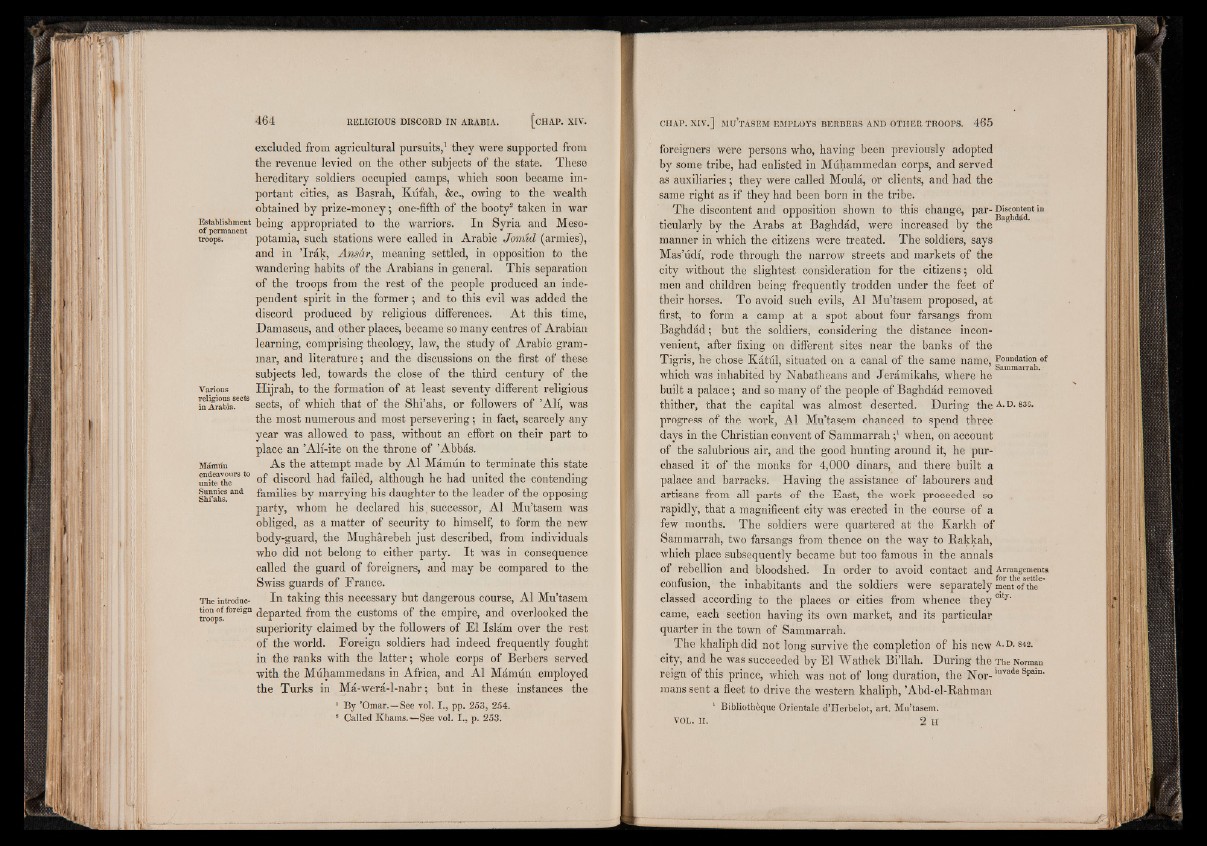
excluded from agricultural pursuits,1 they were supported from
the revenue levied on the other subjects of the state. These
hereditary soldiers occupied camps, which soon became important
cities, as Basrah, Kufah, &c., owing to the wealth
obtained by prize-money; one-fifth of the booty2 taken in war
Establishment being appropriated to the warriors. In Syria and Mesoo
f permanent . 1 , . n i • a 1 • v /< 7 / • v
troops. potamia, such stations were called in Arabic Jomid, (armies;,
and in ’Irak, Ansar, meaning settled, in opposition to the
wandering habits of the Arabians in general. This separation
of the troops from the rest of the people produced an independent
spirit in the former; and to this evil was added the
discord produced by religious differences. At this time,
Damascus, and other places, became so many centres of Arabian
learning, comprising theology, law, the study of Arabic grammar,
and literature; and the discussions on the first of these
subjects led, towards the close of the third century of the
Various Hijrah, to the formation of at least seventy different religious
inArabia!eCtS sects, of which that of the Shi’ahs, or followers of ’Ali, was
the most numerous and most persevering; in fact, scarcely any
year was allowed to pass, without an effort on their part to
place an ’Ali-ite on the throne of ’Abbas.
Manuin As the attempt made by A1 Mamun to terminate this State
unbTtherS 40 °f discord had failed, although he had united the contending
Shfahs5 md lhmilie.4 by marrying his daughter to the leader of the opposing
party, whom he declared his, successor, A1 Mu’tasem was
obliged, as a matter of security to himself, to form the new
body-guard, the Mugharebeh just described, from individuals
who did not belong to either party. It was in consequence
called the guard of foreigners, and may be compared to the
Swiss guards of France.
The introdnc- In taking this necessary but dangerous course, A1 Mu’tasem
troops^foreign departed from the customs of the empire, and overlooked the
superiority claimed by the followers of El Islam over the rest
of the world. Foreign soldiers had indeed frequently fought
in the ranks with the latter ; whole corps of Berbers served
with the Muhammedans in Africa, and A1 Mamun employed
the Turks in Ma-wera-l-nahr; but in these instances the
1 By ’Omar.—See vol. I ., p p . 2 5 3 , 254.
2 Called Khams.—See vol. I., p . 2 5 3 .
foreigners were persons who, having been previously adopted
by some tribe, had enlisted in Muhammedan corps, and served
as auxiliaries ; they were called Moula, or clients, and had the
same right as if they had been born in the tribe.
The discontent and opposition shown to this change, p a r-D is c o n ten t in
ticularly by the Arabs at Baghdad, were increased by the
manner in which the citizens were treated. The soldiers, says
Mas’udi, rode through the narrow streets and markets of the
city without the slightest consideration for the citizens ; old
men and children being frequently trodden under the feet of
their horses. To avoid such evils, A1 Mu’tasem proposed, at
first, to form a camp at a spot about four farsangs from
Baghdad ; but the soldiers, considering the distance inconvenient,
after fixing on different sites near the banks of the
Tigris, he chose Katul, situated on a canal of the same name, of
which was inhabited by Nabatheans and Jeramikahs, where he
built a palace ; and so many of the people of Baghdad removed
thither, that the capital was almost deserted. During the A-D- 83°-
progress of the work, Al Mu’tasem chanced to spend three
days in the Christian convent of Sammarrah f when, on account
of the salubrious air, and the good hunting around it, he purchased
it of the monks for 4,000 dinars, and there built a
palace and barracks. Having the assistance of labourers and
artisans from all parts of the East, the work proceeded so
rapidly, that a magnificent city was erected in the course of a
few months. The soldiers were quartered at the Karkh of
Sammarrah, two farsangs from thence on the way to Rakkah,
which place subsequently became but too famous in the annals
of rebellion and bloodshed. In order to avoid contact and Arrangements,
confusion, the inhabitants and the soldiers were separately ment of the
classed according to the places or cities from whence theyClty’
came, each section having its own market, and its particular
quarter in the town of Sammarrah.
The khaliphdid not long survive the completion of his new A'D- 842.
city, and he was succeeded by El Wathek Bi’llah. During the The Norman
reign of this prince, which was not of long duration, the Nor-luTade sPam-
mans sent a fleet to drive the western khaliph, ’Abd-el-Rahman
1 Bibliothèque Orientale d’Herbelot, art. Mu’tasem.
VOL. II . 2 H